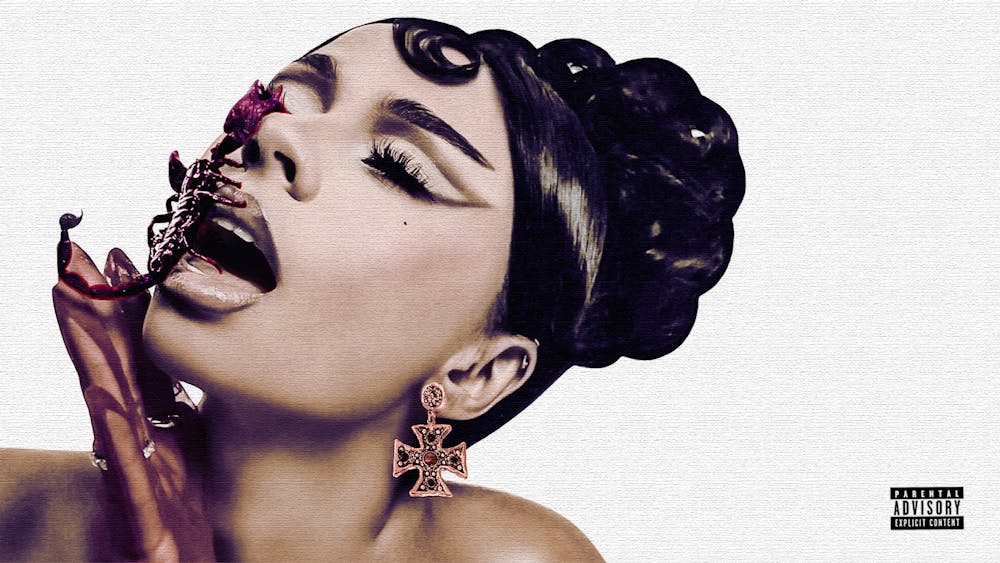R&B singer Mariah the Scientist’s latest album "To Be Eaten Alive," is a testament to her growth and pen as an artist as she tackles her fame, life, and artistry. Released Oct. 27 off of independent label Buckles Laboratories, much of the record’s lyrical content is relevant to Mariah’s experience surrounding her boyfriend Young Thug’s incarceration on May 9, 2022, when Thug and other artists associated with music label and collective YSL were arrested on gang–related Racketeer Influenced and Corrupt Organizations (RICO) Act charges, as well as her struggles handling womanhood and the music industry. This album is a step in the right direction, proving that her art can perhaps hold its own alongside generational contemporaries by the likes of SZA and Summer Walker. However, Mariah's work tends to reflect the tried and true motifs first developed by the genre’s predecessors, incorporating a love–letter style of writing and airy production.
The title, “To Be Eaten Alive,” in many ways, highlights the exceptional emotionality under which many of the songs have been written. Posed with a scorpion crawling across Mariah’s face, the album cover further emphasizes her proximity to pain throughout the project’s creation, almost hinting that she is inviting it into her life. Mariah’s album covers have consistently posed an interesting dichotomy between beauty and violence and love and pain. The 2021 “RY RY WORLD” album pictures a smiling Mariah pierced by a bloodied arrow, perhaps Cupid’s. The 2019 release “MASTER” shows a photoshoot of Mariah sitting with a man standing behind her, his hand placed on the back of her neck in a dominant embrace. These complexities of emotion share that pain and love, misery and happiness are intertwined in her life, a message that is emboldened throughout the progression of the album.
Unfortunately, “Heaven is a Place on Earth” is a sonically lackluster opener, particularly when compared to the strength of the latter half of the project. However, the song is able to set the thematic tone for the rest of the tracklist. She dreams of “painting the crib blue,” asking defiantly, “[y]ou think I'll give it up just for a Patek or a bottle of Ace of Spades?” Her commitment to her lover, known to be Young Thug, shines throughout this first track, as a major lyrical component of the song is her disregard for material, short–term luxury, and the advances of other men. She also nods at the difficulties she’s had to endure to achieve success in music, commenting on the “blood, sweat, and tears put in [the] throne [she] built by hand.”
In “Bout Mine,” one of the more popular songs of the album, Mariah again professes an “in good time and bad” sentiment toward her relationship with Thug. “You know how I’m coming,” she sings, reminding the listener her love is strong and steadfast. “77 Degree (feat. 21 Savage)” is unrivaled in terms of productions and choruses on the album, Mariah’s portion being particularly addictive. However, a weak verse delivered by Savage (one that sounds a lot like a patchy Big Sean parody) brings down its collective impact.
All of these themes merge the album’s stand-out track, “Lovesick,” as she sings directly to Thug in the second–person, in something of an open letter. The lyrics on this ballad are particularly diaristic. “Even when I think I suffer, I think of your kids, your mother,” she tells him. “I have to commend my lover,” she admits, “when I think about how it must feel to be you.” Since the release of the album, Thug has been in jail for over a year and repeatedly denied bail. Mariah sings honestly about her loneliness with her partner incarcerated and forcibly separated from her, explaining that “in [her] eyes, nobody gets it.” Part of what makes this song the highlight of the project is Mariah’s stellar vocal performance, as she displays impressive range and technique in the chorus.
The specificity of the album’s subject matter can be novel for listeners, as direct references are relatively rare in the R&B genre. That being said, not all of the album is loyal to these explicit references. “Different Pages” seems to depart from the Young Thug themes, as the narration confronts a more general story, Mariah’s qualms with an ex–lover with whom the relationship could not last. The angelic and dreamy track is credited to producers Aire Atlantica, 18YOMAN, and LEN20, as their work truly elevates the track.
The album finishes with a Young Thug feature on “Ride (feat. Young Thug),” which maintains characteristic R&B production, though Thug’s vocals are upbeat and reminiscent of an Afrobeat vocal. The song is a duet and acts as a testament to their relationship. Mariah sings about her desire to “turn that Miss to Mrs,” specifically referencing Thug with the line “[s]ay he love Mariah, I might change it to Williams,” as Thug’s legal name is Jeffery Lamar Williams.
Ultimately, though, what could’ve been a cohesive, well–executed album, with the melodic and lyrical punch seen in tracks six to nine, falls short otherwise. Earlier songs fade together, a generally common trend in modern R&B that cannot succeed in being sonically groundbreaking or be catchy enough for mainstream marketability. However, the success of the later tracks suggests that Mariah shows much promise as she gains her footing as a genre leader. Her ability to match unique, persuasive songs with personal accounts of loss and hope is not to be forgotten. Still, her success in capitalizing on this ability even more in future projects is paramount.







